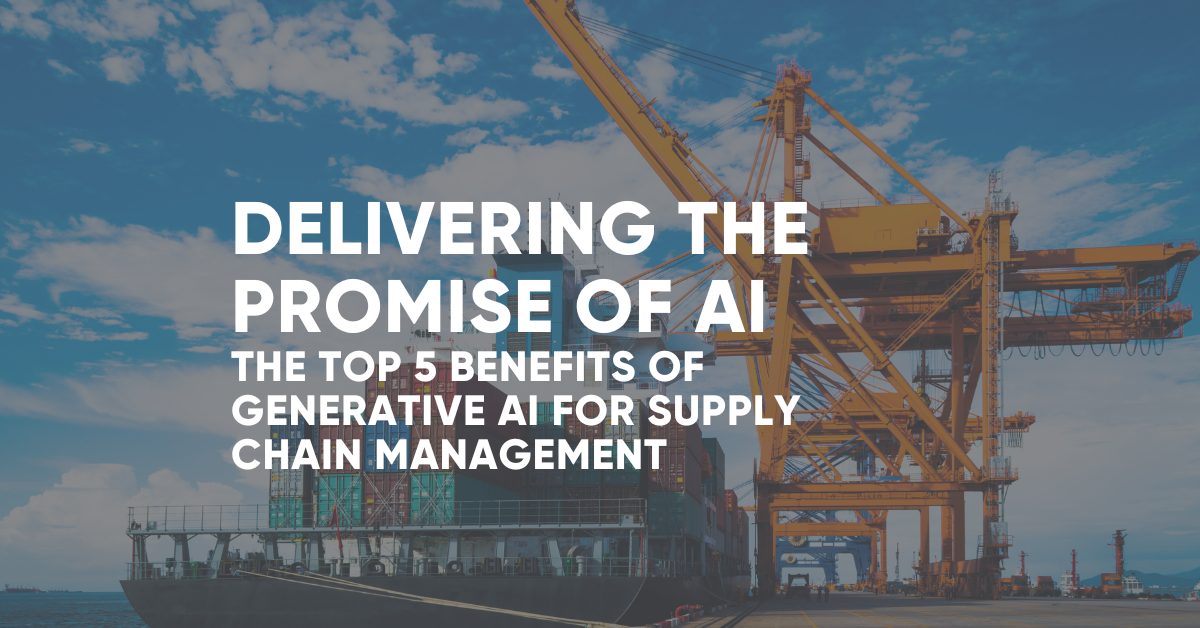The last few years have shown us that the world’s supply chains are far more fragile than a typical consumer imagined. Short-term disruptions can have long-term consequences including declining profits, eroding customer trust, and even business failures.
The good news is that the advent of Generative AI is revolutionizing the way supply chains operate, offering a multitude of benefits and use cases that were once considered the stuff of science fiction. Let’s take a look at some of the most significant advantages of Generative AI for Supply Chain professionals, and delve into real-world examples that highlight its transformative potential.
The Power of Generative AI
Generative AI is a subset of artificial intelligence that focuses on generating content, data, or even decisions autonomously. It leverages deep learning models like GPT-3 and GPT-4 to understand, mimic, and generate human-like text, images, and more. Non-engineers can query data with natural-language, AI can summarize complex topics and make it accessible, and complex data can be analyzed quickly and accurately so that AI can make recommendations based on the output. In the context of supply chain management, this technology is a game-changer, offering a range of benefits that enhance efficiency, reduce costs, and drive innovation.

The Top 5 Benefits of GenAI in Supply Chain Management
#1 Enhanced Demand Forecasting:
Generative AI can analyze vast datasets, historical sales records, market trends, and external factors with remarkable accuracy. This enables it to provide more reliable demand forecasts, helping organizations optimize inventory levels and minimize costly overstock and stockouts.
#2 Optimized Inventory Management:
Maintaining the right inventory levels is critical for cost efficiency. Generative AI continuously monitors demand fluctuations, supplier performance, and lead times. It can recommend optimal reorder points and quantities, leading to reduced carrying costs and improved cash flow.
#3 Real-Time Decision Support:
Generative AI can provide real-time decision support by processing complex data and offering actionable insights. It helps supply chain managers make informed decisions quickly, even in rapidly changing environments.
#4 Supplier Relationship Enhancement:
By analyzing supplier data, performance metrics, and market dynamics, Generative AI can identify potential risks and recommend alternative suppliers or negotiation strategies. This ensures a resilient supply chain, reducing disruptions.
#5 Route Optimization:
Optimizing transportation routes can significantly reduce transportation costs and delivery times. Generative AI can calculate the most cost-effective and timely routes, factoring in variables like traffic, weather, and fuel costs.
Bonus Benefits
The Top 5 is just the beginning. Generative AI can help in many additional areas of Supply Chain and Logistics, including:
Warehouse Management:
AI-driven robotics and automation can optimize warehouse operations, including inventory picking, packing, and sorting. It can increase efficiency and reduce labor costs.
Quality Control:
AI can assist in quality control by analyzing sensor data, images, and other inputs to identify defects or anomalies in products or materials.
Predictive Maintenance:
AI can predict equipment failures by analyzing data from IoT sensors. This allows for proactive maintenance, reducing downtime and maintenance costs.
Risk Management:
AI can assess and mitigate risks in the supply chain, such as natural disasters, geopolitical events, or supplier disruptions, by analyzing relevant data and providing contingency plans.
Cost Reduction:
AI can identify cost-saving opportunities across the supply chain, from procurement to distribution, through data-driven insights and process optimization.
Customer Experience:
AI can improve customer service and satisfaction by providing real-time tracking of shipments, accurate delivery estimates, and personalized product recommendations.
Sustainability:
AI can help in tracking and reducing the environmental impact of the supply chain by optimizing transportation routes, reducing waste, and promoting sustainable sourcing.
Compliance and Regulatory Compliance:
AI can assist in monitoring and ensuring compliance with various regulations and standards, reducing the risk of non-compliance penalties.
GenAI in Action: Real-World Examples

Amazon, one of the world’s largest e-commerce and logistics companies, has been a pioneer in leveraging AI to enhance its supply chain operations. The company uses AI and machine learning for various applications, including demand forecasting, inventory management, and route optimization. Amazon’s AI-driven logistics systems have allowed the company to improve delivery times, reduce transportation costs, and enhance customer satisfaction by ensuring timely and efficient deliveries.

Maersk, one of the world’s largest container shipping companies, has implemented AI and data analytics to optimize its supply chain and container logistics operations. Maersk uses AI algorithms to forecast demand, optimize vessel schedules, and improve the overall efficiency of its container shipping services. By harnessing AI-driven insights, Maersk has been able to make more informed decisions, reduce fuel consumption, and optimize container routes, ultimately leading to cost savings and improved service quality.
Challenges and Considerations
While Generative AI offers tremendous potential, there are challenges and considerations that organizations must address:
Data Quality: Generative AI relies heavily on data. Ensuring data accuracy and quality is crucial for reliable results.
Ethical Considerations: AI-generated decisions should align with ethical and legal standards. Biased or unfair outcomes must be avoided.AI algorithms should be regularly monitored and adjusted to improve output.
Integration: Integrating Generative AI into existing supply chain systems may require significant effort and investment.
Talent: Organizations need skilled AI professionals to develop, deploy, and maintain Generative AI solutions. Organizations need to decide if they want to develop solutions in-house, or work with a trusted service provider.
Generative AI is reshaping the landscape of supply chain management, offering benefits ranging from improved demand forecasting and optimized inventory management to real-time decision support and enhanced supplier relationships. In the very near future, Generative AI will likely become a standard tool for supply chain professionals seeking to gain a competitive edge. Embracing this transformative technology can lead to more efficient, cost-effective, and innovative supply chains that meet the demands of today’s dynamic markets.

